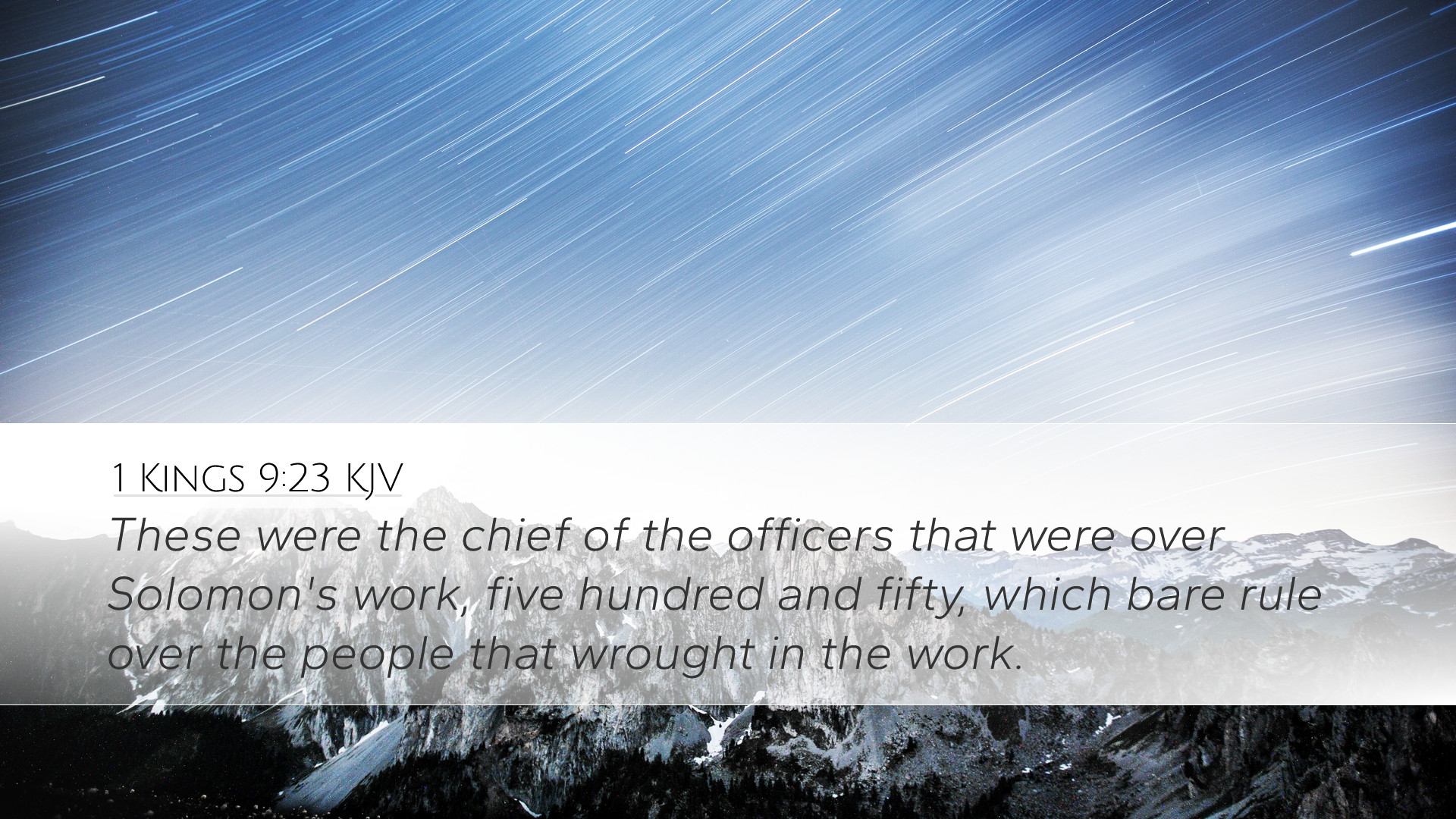Commentary on 1 Kings 9:23
This verse reads: "These were the chief officers who were over Solomon's work, five hundred and fifty, who ruled over the people doing the work." The context of this passage emphasizes the organization and administration of Solomon's extensive building projects, particularly the construction of the temple and his palace.
General Overview
1 Kings 9:23 illustrates Solomon's strategic approach to governance, showcasing both his ambition and his ability to manage large-scale projects. In drawing on insights from public domain commentaries, we can discern several layers of meaning within this verse.
Insights from Matthew Henry
Matthew Henry offers a pastoral perspective on the verse. He notes that Solomon's administration stands as a testament to the importance of order and organization in any significant undertaking. By appointing chief officers, Solomon demonstrated wisdom in delegating responsibilities:
- Delegation of Authority: Solomon's appointing of 550 chief officers highlights his understanding that effective leadership requires shared responsibilities.
- Vision and Execution: The vast number of officers implies a considerable vision for Israel’s infrastructure, which Henry suggests symbolizes God’s blessings in giving Solomon wisdom in leadership.
- Community Participation: This administrative structure also indicates that the community was involved in these endeavors, fostering a sense of collective purpose among the people.
Insights from Albert Barnes
Albert Barnes complements Henry's observations with a focus on the societal implications of such an administrative structure. He emphasizes the following points:
- Governance Systems: Barnes points out that Solomon established a system that could manage and supervise the diverse laborers involved in the construction endeavors, reflecting a sophisticated understanding of governance.
- Workforce Organization: The organization of labor under dedicated officers suggests an effective approach to mobilizing human resources for the kingdom's objectives.
- Historical Context: Barnes also places this in the historical context of Israel, where such an organized structure was a marked improvement from previous disarray, linking it to the blessings associated with Solomon's reign.
Insights from Adam Clarke
Adam Clarke provides a scholarly viewpoint regarding the specifics of the workforce mentioned in the verse. Clarke elaborates on the following aspects:
- Fifty Officers: The mention of 550 chief officers may reflect Clarke's interpretation of the divisions of labor which were necessary to complete such monumental projects, drawing parallels to military and administrative efficiency.
- Responsibilities Assigned: Clarke suggests that these officers were likely assigned specific tasks, which fostered specialization that allowed for increased productivity and skillful execution of work.
- Biblical Significance of Numbers: Clarke also discusses the symbolic meaning of numbers in the Bible, implying that the number 550 may represent completeness in Solomon's structure of governance, signaling fullness in administration and support of God’s favor.
Theological Insights
Combining these perspectives, we can distill key theological insights applicable to modern believers:
- Divine Providence: The organization of work under Solomon emphasizes the idea of divine providence; God provides the necessary people and resources to accomplish His purposes.
- The Importance of Leadership: Effective leadership is vital for the church and any community endeavor, encouraging adherence to order, structure, and cooperation amongst its members.
- Community Responsibility: As believers engage in ministry, the involvement of the laity mirrors the cooperation seen in Solomon's administration, suggesting that all should play a role in furthering God's kingdom.
Practical Applications
For pastors and leaders today, the principles drawn from 1 Kings 9:23 can be practically applied:
- Encourage Delegation: Leaders should empower others in the community by delegating responsibilities appropriately.
- Promote Skill Development: Offering training and clear roles fosters skill development, paralleling the organization seen in Solomon's workforce.
- Foster a Collective Vision: Create a unified vision that invites participation from all members, reflecting the collective efforts seen in Solomon’s project.
Conclusion
In summary, 1 Kings 9:23 serves as not only a historical account of Solomon's administrative acumen but also presents timeless truths about leadership, community, and divine provision. By understanding and implementing these insights, modern leaders can enhance the efficacy and health of their ministries and communities.


